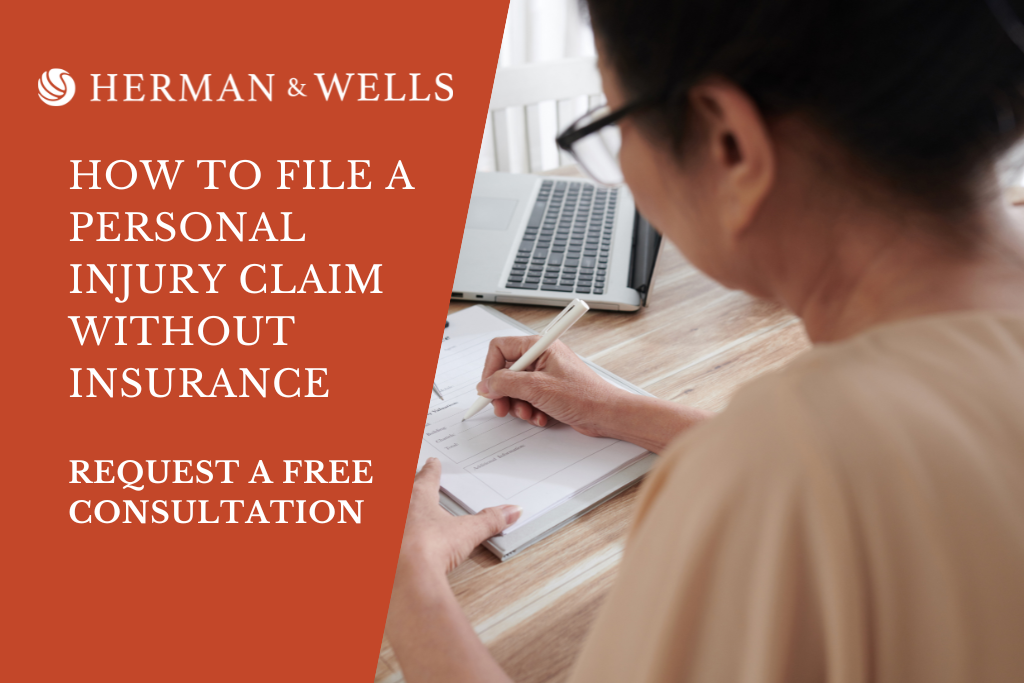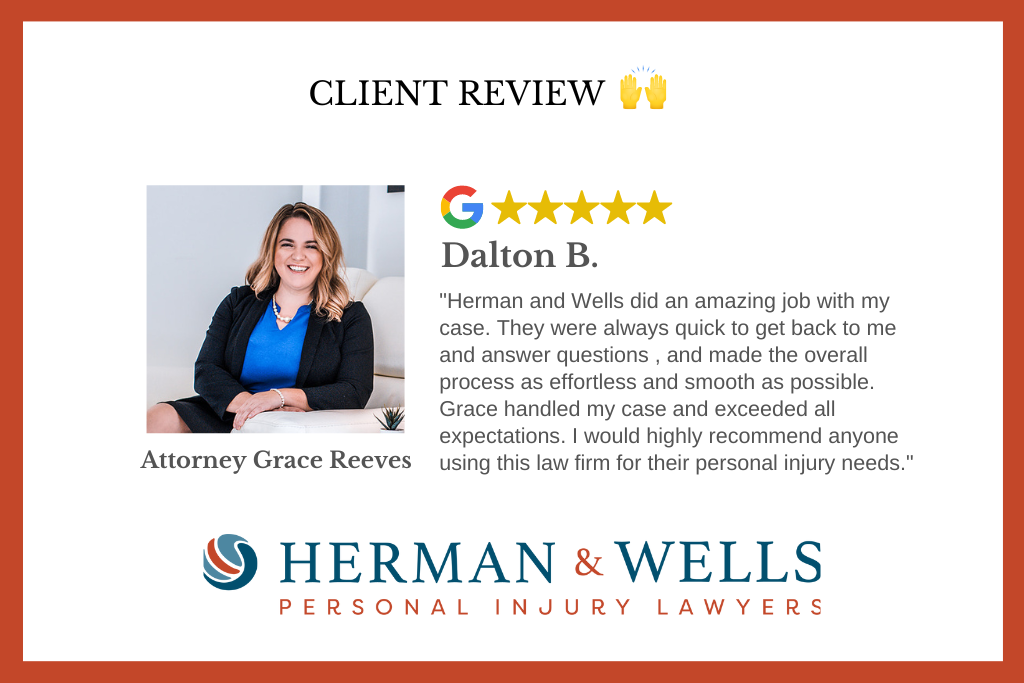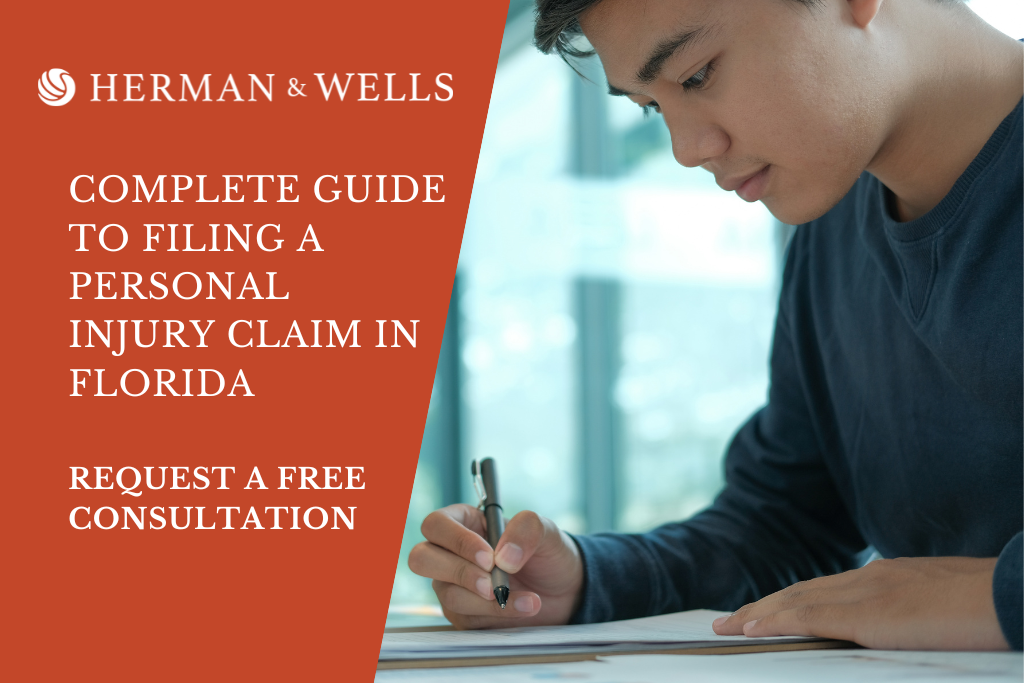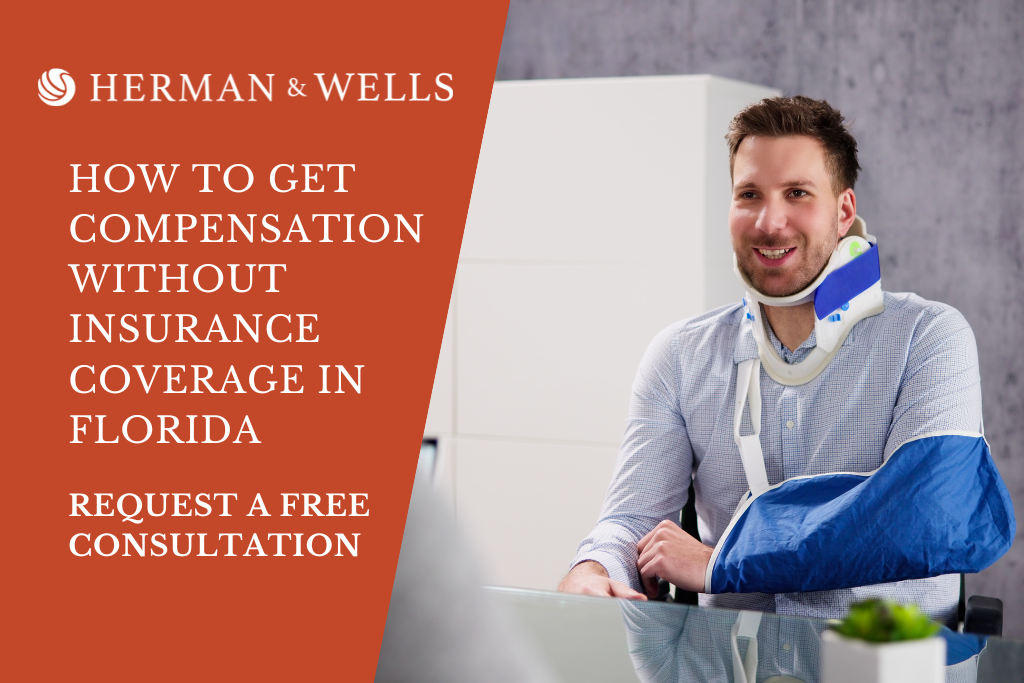Accidents can happen at the blink of an eye. What do you do when you find yourself injured in an accident and you lack insurance? In Florida, you still have rights and can file a personal injury claim, even without insurance. At Herman and Wells, we understand how complicated personal injury law can be. Whether you’ve been in a car accident, suffered a slip-and-fall, or any other injuries you have faced any other injuries due to another’s negligence, our expert attorneys are here to help! Contact us today at (727) 821-3195 for a free consultation and let us fight for the compensation you deserve.

The Cliff Notes: Key Takeaways From This Post
- 1
What is a Personal Injury Claim: A personal injury claim is a legal case you can open if you’ve been hurt in an accident and it was someone else’s fault.
- 2
Common Types of Injury Claims: Common types of injury claims include, car accidents, slip and fall accidents, medical malpractice, product liability, and dog bites.
- 3Your Legal Rights: Even though you’re uninsured, you still have the right to pursue damages for damages for medical bills, lost income, and pain and suffering.
- 4
Florida Laws: In Florida, the comparative negligence law rule allows for your compensation to be reduced by your share of fault, and you have two years from the date of injury to file a claim. Due to Florida’s no-fault law and the fact that you are uninsured, you have to file with the at – fault driver first.
- 5
Call (727) 821-3195: Find out how the personal injury attorneys at Herman and Wells can help you today!
What Is A Personal Injury Claim?
A personal injury claim is your pathway to justice if you have been hurt due to someone else’s negligence or intentional actions. It’s your chance to seek compensation for the damages you’ve suffered, whether that’s through medical bills, lost wages, pain and suffering, or other costs. In Florida, these claims can arise from various incidents like car accidents, slip and falls, medical malpractice, and workplace injuries.
Common Types Of Personal Injury Claims In Florida
In Florida, personal injury claims often fall into several key categories that touch many lives:
Car Accidents
From minor fender benders to major collisions, victims can suffer from whiplash, broken bones, and even more severe injuries. Gathering all possible evidence for the scene – such as photos, witness statements, and police reports can significantly bolster your claim.
Slip And Fall Accidents
Slip and fall accidents usually occur due to hazardous conditions like wet floors, uneven surfaces, or poor lighting. Property owners have a responsibility to maintain a safe environment, and if they fail to do so, they can be held liable for any resulting injuries. Documenting the conditions that led to your all and obtaining medical records will be essential for proving negligence.
Medical Malpractice
Medical malpractice occurs when a healthcare provider deviates from standard practices, causing harm to a patient. Examples include misdiagnosis, surgical errors, and medication mistakes. Expert testimony is often crucial in these cases to establish a breach of the standard of care.
Product Liability
Manufacturers are responsible for ensuring their producers are safe for consumer use. When a defective product causes injury, you can file a product liability claim. This can cover a range of programs, from faulty auto parts to dangerous pharmaceuticals. Keep the defective product and all related documentation, such as purchase receipts and user manuals, to support your claim.
Dog Bites
In Florida, dog owners are strictly liable for injuries their pets cause, regardless of whether the dog has shown previous aggression. Dog bite claims can cover medical treatment, rabies shots, and even cosmetic surgery if necessary. Photographs of the injuries and any reports to animal control can serve as strong evidence in your case.
Legal Rights Of Uninsured Individuals In Florida
Being uninsured doesn’t strip you of your legal rights! In Florida, uninsured individuals can still file personal injury claims to seek compensation from the at-fault party. Whether insured or not, you have the right to pursue damages for damages for medical bills, lost income, and pain and suffering.
Rights To Compensation Without Insurance
Even without insurance, you deserve compensation for:
- Medical Expenses: From emergency room visits and surgeries to medications, physical therapy, and future medical needs.
- Lost Wages: Get back the income you missed out on because you couldn’t work.
- Pain and Suffering: Cover the emotional and physical toll the injury has taken on your life.
- Property Damage: Repair or replace your damaged property, like a car in an accident.
Relevant Florida Laws
Several Florida Laws are crucial for personal injury claims:
- Comparative Negligence: Florida’s pure comparative negligence rule means your compensation can be reduced by your share of fault.
- Statute of limitations: Typically you have two years from the injury date to file a claim in Florida. If you miss this deadline you could lose your right to compensation.
- No Fault rule for Car Accidents: Florida’s no fault system usually means you seek compensation from your insurer first. But since you’re uninsured, you’d file directly against the at-fault driver.
Steps To Take After Sustaining An Injury
Understanding the right steps to take immediately after an injury can greatly boost the success of your claim.
Seek Medical Attention
Your health comes first! Don’t hesitate to seek medical attention right away even if your injuries seem minor. Quick medical care not only ensures your well – being but also creates a medical record for your claim.
Document The Incident
Collect as much evidence as possible:
- Photographs and Videos: Capture the scene of the accident, your injuries, and any property damage.
- Witness information: Get names and contact information of witnesses.
- Police Reports: if applicable, request a copy of the official police report.
- Medical records: Keep detailed records of all medical treatments and expenses
Gather Evidence
Gathering evidence is critical to the strength of your personal injury claim. Beyond the initial documentation, seek to obtain any supplementary evidence that can corroborate your account of the incident. This may include securing surveillance footage from nearby cameras, collecting detailed statements from eyewitnesses, and maintaining a journal of your injuries and recovery process. This journal can offer a day to day account of your pain levels, the impact on your daily activities, and your emotional well-being.
Filing The Personal Injury Claim
With the help of your attorney, file your personal injury claim. Your attorney will guide you through the legal process, ensuring all paperwork is correctly completed and submitted. Be prepared to provide all necessary documentation and evidence to support your case. Being thoroughly prepared will strengthen your position and increase the likelihood of a favorable outcome.
Initial Consultation With An Attorney
Meeting with an attorney can bring up a range of emotions that can sidetrack you, this is why it’s important to properly prepare for your initial consultation. During your consultation, your attorney will go over the details of your case, like how the injury happened, the evidence you have collected, and what damages you might claim. Be ready to discuss the accident in detail and bring relevant documents and photos if your meeting is in person. It is in your best interest to come in with plenty of questions.
Ask about your lawyer’s experience with cases like yours, the strengths and weaknesses of your case, the timeline, their fee structure. Don’t forget to ask about possible outcomes and whether they think it is better to settle or go to trial. Knowledge is power, and knowing these details will help you make informed decisions, keep you emotionally grounded, and set realistic expectations for your claim.

Preparing And Submitting Your PI Claim
Preparation is the cornerstone of a successful personal injury (PI) claim. After gathering all evidence, neatly organize them in a binder or digital folder for quick access. A well-organized claim not only highlights your seriousness but also boosts your chances of a positive outcome.
Once all your documentation is in order, collaborate with your attorney to craft a compelling claim that details your injuries, their impact on your daily life, and your financial losses.
This thorough preparation not only streamlines the submission process but also lays a solid foundation for negotiating a fair settlement or, if necessary, pursuing litigation.
Key Documentation You’ll Need
- Medical records: Detailed reports of initial assessments, treatments, and follow-up appointments to show the extent of injuries and required medical attention.
- Police reports: Official accounts of the incident to corroborate your version of events, if applicable.
- Witness statements: Testimonies that you gathered from individuals who saw the incident and can provide unbiased support.
- Photographs and videos: Visual evidence of the accident scene, injuries, and property damage to illustrate the severity of the situation.
- Correspondence with insurance companies: Documents showing attempts to resolve the matter and the responses received.
- Financial records: Details of expenses incurred due to the injury, including medical bills, rehabilitation costs, and lost wages.
Handling Challenges In The Personal Injury Claims Process
Navigating the personal injury claims process can feel like a daunting journey, but with strategic planning and resilience, you can conquer the obstacles in your path. From unexpected delays to uncooperative insurance adjusters and confusing legal jargon, it’s easy to feel overwhelmed, especially when you’re also dealing with physical and emotional recovery. Lean on your support system of friends and family for emotional backing, and don’t hesitate to seek your lawyer’s advice.
Proving Fault And Damages
Establishing fault and accurately assessing damages are crucial for a successful personal injury claim. To prove fault, you need to show that the other party’s negligence caused the accident and your injuries. This often means gathering compelling evidence like police reports, witness statements, and expert analyses.
Once the fault is clear, the next step is quantifying the damages. This involves detailed documentation of all your economic and non-economic losses. Economic damages could include medical bills, rehab costs, and lost wages, while non-economic damages cover pain, suffering, emotional distress, and loss of quality of life.
Dealing With Insurance Companies
Dealing with insurance companies can be one of the toughest parts of a personal injury claim. These adjusters are pros at minimizing payouts, often using tactics that delay or devalue your claim. Being prepared and standing firm from the start is crucial. Always communicate clearly and back up your claims with thorough documentation, including medical records and evidence of fault.
Be careful that you don’t say anything that can be used against you later. It’s smart to let your attorney handle these talks to protect your rights and boost your chances of a fair settlement. Remember, patience and persistence are vital when negotiating with insurance companies.
Negotiating A Settlement
Negotiating a settlement is a fine art that blends strategy, evidence, and patience. Start by diving deep into your case documents, they will be your tools. Lay out your initial demand with clarity, backing it up with all the solid evidence you’ve gathered to show the true extent of your damages.
Expect a counteroffer from the insurance company and stay flexible yet firm in your stance. Patience is crucial here; rushing could mean settling for less than you deserve. Bringing in your attorney can also be a game-changer. Their knack for negotiation and understanding of fair compensation standards can significantly boost your chances of securing a fair settlement.
The Role Of A Personal Injury Attorney
A personal injury attorney is your champion in the fight for the compensation you deserve. They expertly navigate the maze of the legal system, guiding you from the initial claim filing to the final settlement. With a keen eye for detail, they gather crucial evidence like medical records, witness statements, and accident reports to build a compelling case. They also handle all communications with insurance companies, ensuring nothing you say or do compromises your claim.
Armed with in-depth knowledge of personal injury law, they negotiate vigorously, countering lowball offers and, if needed, stand by your side in court. Their dedication not only boosts your chances of a favorable outcome but also lets you focus on what truly matters, your recovery.
Can I Afford To Hire A Personal Injury Attorney Without Insurance?
Yes, you can hire a personal injury attorney even without insurance! Most operate on a contingency fee basis, meaning they only get paid if you win or settle your case. No upfront payments or hourly rates, just accessible legal representation when you need it most. The attorney’s fee is a percentage of your compensation, so their payment depends on your success. This system not only cuts financial barriers but also aligns their interests with yours. Both of you are driven to achieve a winning outcome!
No Insurance? Contact The Personal Injury Lawyers At Herman & Wells
If you find yourself without insurance and in need of legal assistance following an injury, reaching out to the personal injury lawyers at Herman & Wells should be your first step. Their team is dedicated to providing expert legal representation. With their extensive experience and commitment to justice, Herman & Wells can help you navigate the complexities of personal injury law and so you can focus on your recovery.
Ready to take the next step? Reach out to our attorneys at (727) 821-3195 for a free consultation. We’re here to support you every step of the way!




